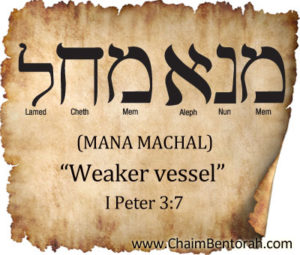Hebrew Word Study (Aramaic)– Weaker Vessel – Mana Machal מנא מחל
I Peter 3:7: “Likewise, ye husbands, dwell with them according to knowledge, giving honour unto the wife, as unto the weaker vessel, and as being heirs together of the grace of life; that your prayers be not hindered.”
 The wife is the weaker vessel. Try that one out at the next women’s march. You may discover that they are not all that weak. In the Greek the words weaker vessels are asthenestero skevel. Asthenestero comes from the root word asthenes which means to be delicate weak, sickly, infirmed, without strength and/or unimpressive. Skevel is the word for a vessel which doesn’t help this politically incorrect situation at all because it means property, merchandise or goods that is carried in a vessel. That does not make sense at all if we are to give honor to the wife as a piece of weak, unimpressive merchandise? Perhaps we could say that we are to honor the wife as you would with a delicate piece of merchandise. Some women might like that but still many would take offense to that as it still suggests she is just property.
The wife is the weaker vessel. Try that one out at the next women’s march. You may discover that they are not all that weak. In the Greek the words weaker vessels are asthenestero skevel. Asthenestero comes from the root word asthenes which means to be delicate weak, sickly, infirmed, without strength and/or unimpressive. Skevel is the word for a vessel which doesn’t help this politically incorrect situation at all because it means property, merchandise or goods that is carried in a vessel. That does not make sense at all if we are to give honor to the wife as a piece of weak, unimpressive merchandise? Perhaps we could say that we are to honor the wife as you would with a delicate piece of merchandise. Some women might like that but still many would take offense to that as it still suggests she is just property.
Was Peter just a chauvinistic pig? Let’s start at the very beginning. Did Peter the beloved disciple really write first and second Peter? Obviously this rough uneducated man who spoke Aramaic could not have written this passage in such beautiful Greek which could have only been written by an educated person fluent in Koine Greek. Most likely Peter either wrote this in Aramaic or it was translated into Greek by a Scribe, but the original would have been in Aramaic.
When I go to the Aramaic version of this letter I find something much more politically correct making more sense than calling wives weak vessels. The word for vessel in Aramaic is mana which is a word for garments or clothes. Its root comes from a Phoenicians origin for the outrigging’s of a ship. The outrigging’s of a ship are what keeps the ship on course and moving. Without it the ship is dead in the water.
So this vessel idea is really speaking of a ship and the outrigging of a ship. The outrigging includes the sails which power the ship and the rudders that guide and navigates the ship. It would be fitting for a former fisherman to use a seafaring illustration. The word for weak in the Aramaic is the word machal which means weak but weak only in the sense of paying off a debt to a debtor so he has no power over you and is weakened. Machal is more of the idea of neutralizing a threat. So following a nautical motif when the word machal, to neutralize a threat, is used as an adjective to the word mana the outrigging of a ship it would express the idea of a wife who is the outrigging of the vessel her husband. When the storms of life comes the sailor uses the outrigging, the anchor, the rudder and the sails to steer the ship in such a way as to weather out the storm. Without the outrigging the vessel is dead in the water and will sink in a storm. When the storms of life comes the wife and husband work together to navigate and ride out the storm. So a man honors his wife as a sailor honors the outrigging of his ship. He takes care of her, protects her so that when the storms come they can work together to reach their destination safely.







Recent Comments